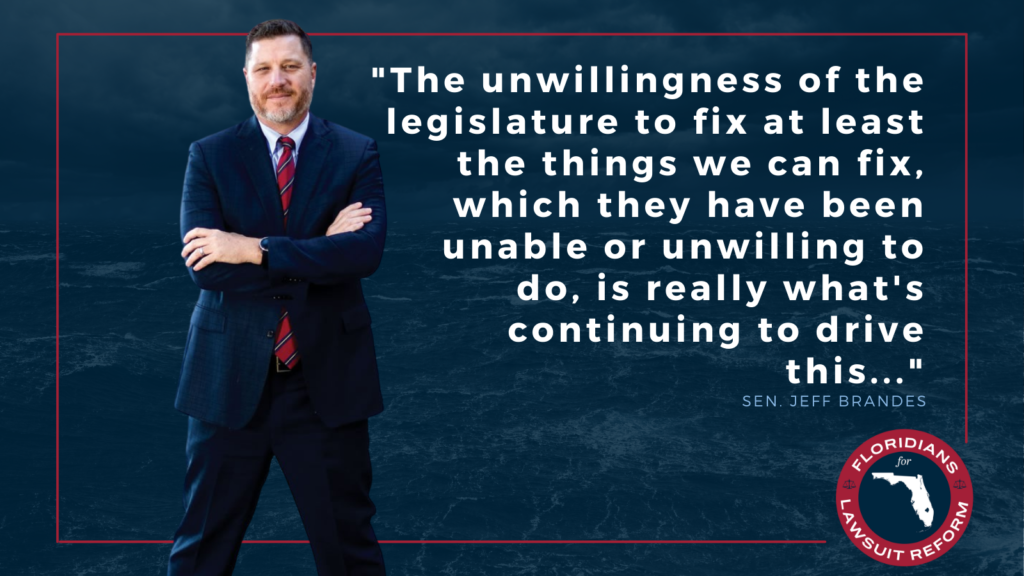
The failure of the Florida legislature to pass any new property insurance reform measures this year has added more uncertainty to an already reeling homeowners market.
Two bills were put forward in the latest legislative session. One would have allowed insurers domiciled in the state to sell surplus lines insurance, while the other focused on limiting lawsuits and costs connected to roof damage claims as well as reducing the number of homeowners insured by Citizens Property Insurance Corp. Both bills were passed by the Senate and sent to the House in early March, but neither got floor votes in the lower chamber.
Sen. Jeff Brandes, a Republican who represents part of Pinellas County and serves on the banking and insurance committee, said the lack of legislative action was one element of a “perfect storm” plaguing the property insurance market.
“The unwillingness of the legislature to fix at least the things we can fix, which they have been unable or unwilling to do, is really what’s continuing to drive this, and [to] recognize that the trial bar plays chess while the rest of the legislature plays checkers,” Brandes said in an interview.
Florida in a prior session did pass legislation to change the rules regarding third-party litigation. Gov. Ron DeSantis in June 2021 signed into law SB 76, which included provisions to limit attorney fees and cut the time limit to file damage claims to two years from three years. But less than two weeks after the law went into effect, a federal judge blocked a crucial provision that prohibited contractors from using certain forms of advertisement, such as emails, to entice homeowners to file roof damage claims, saying the law violated their right to free speech.
No letup in litigation
While state legislators and officials search for solutions to the property insurance crisis, litigation generated by claims from contractors and consumers continues to skyrocket.
Florida insurers in 2021 were served with 100,595 lawsuits seeking a total of $7.8 billion in damages, according to risk consultant Guy Fraker. Comparatively, a total of 24,700 lawsuits seeking $2.4 billion in damages were filed in the other 49 U.S. states combined.
Fraker in a report said the revenue stream generated by litigation rose in 2021 to approximately $5 billion, from $4 billion just two years earlier. Litigation expenses are putting the Florida real estate market at risk, Fraker said, and impacting affordable housing for the state’s service industry workforce. The real estate and service industries are “two essential economic engines in Florida’s economy,” he added.
The rising tide of lawsuits has had a significant impact on the state’s insurance market.
United Property & Casualty Insurance Co. cited “worsening litigation trends” as one of the reasons it stopped writing new homeowners policies as of Jan. 1, Insurance Journal reported. Florida Farm Bureau Casualty Insurance Co. made the same move, effective Feb. 1, while The Progressive Corp. has dropped 56,000 policies for homeowners with roofs older than 15 years.
Also, two Florida-focused homeowners insurers, Avatar Property & Casualty Insurance Co. and St. Johns Insurance Co. Inc., have been liquidated since the start of this year.
Citizens’ exposure soaring
More and more consumers are being forced to turn to the state’s insurer of last resort for affordable homeowners coverage. Florida state law limits annual rate increases on policies provided by Citizens to 11%; private-sector insurers are not under such limitations.
During a rate hearing presentation, Citizens CEO Barry Gilway said the insurer’s average premium for HO-3 policies is 28% lower than its competitors in Broward, Miami-Dade and Palm Beach counties. More than half of Citizens’ policies come from that tri-county region, Gilway said.
Citizens’ policies in force rose 39.7% year over year in 2021 and stood at more than 792,600 at the end of February. The state insurer of last resort expects that number to climb to over 1 million by the end of 2022.
Gilway called on Florida’s state regulator to help narrow the price gap between Citizens and private-sector insurers to stem the tide of rising policies in force.
“We don’t like to increase rates, but the environment demands, given the underwriting losses, that we do so,” the CEO said. “Approving the maximum increase allowed by statute … would definitely have a major impact on our growth.”
